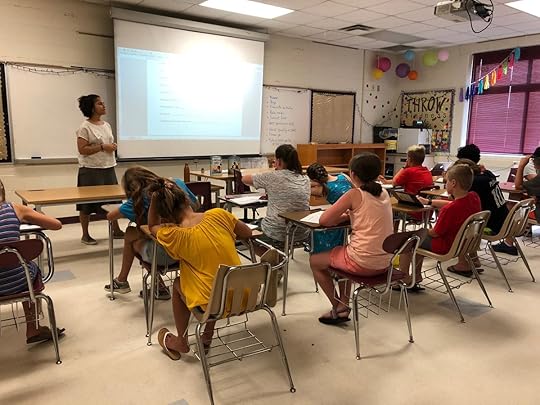Zetta Elliott's Blog, page 21
August 5, 2019
magic bullet
 Saturday was magical. I went to Lancaster for the fourth time and came home convinced that I was making the right decision to move out there. I spent some time alone in the apartment and started to imagine how I could improve the space and where my furniture would go. Then I had lunch at a new Vietnamese spot just a few blocks away before heading over to the town square for the African American Heritage walking tour. I seemed to be the only person taking the tour on my own, but before long the other members of the group started chatting with me and by the end, I think I’d shared an exchange with just about everyone. I gave a book to the two Black boys on the tour and learned one of them had dreams of becoming a writer himself. A retiree asked if I
Saturday was magical. I went to Lancaster for the fourth time and came home convinced that I was making the right decision to move out there. I spent some time alone in the apartment and started to imagine how I could improve the space and where my furniture would go. Then I had lunch at a new Vietnamese spot just a few blocks away before heading over to the town square for the African American Heritage walking tour. I seemed to be the only person taking the tour on my own, but before long the other members of the group started chatting with me and by the end, I think I’d shared an exchange with just about everyone. I gave a book to the two Black boys on the tour and learned one of them had dreams of becoming a writer himself. A retiree asked if I 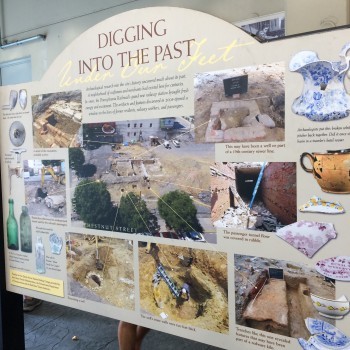 knew anyone in Lancaster and when I said not really, he asked our guide for a piece of paper and stopped to write down his name and number. There were quite a few seniors on the tour and I’m not going to lie—I really needed to see some good-hearted White people this weekend. The interracial group that runs this tour is using the funds they raise to put up markers around the city so that everyone can learn about Black residents’ contributions to Lancaster. There are the official historical markers put up by the city but none of them references people of color. Our “conductor” Debbie stressed at the very beginning that one goal of the tour is to show the cooperation of Blacks and Whites in the struggle for social justice. And “station masters” (some
knew anyone in Lancaster and when I said not really, he asked our guide for a piece of paper and stopped to write down his name and number. There were quite a few seniors on the tour and I’m not going to lie—I really needed to see some good-hearted White people this weekend. The interracial group that runs this tour is using the funds they raise to put up markers around the city so that everyone can learn about Black residents’ contributions to Lancaster. There are the official historical markers put up by the city but none of them references people of color. Our “conductor” Debbie stressed at the very beginning that one goal of the tour is to show the cooperation of Blacks and Whites in the struggle for social justice. And “station masters” (some  descended from 19th-century Lancaster residents) repeated that message, referencing the Fugitive Slave Law and the occasions when Whites stood up, defied the law, and prevented Blacks from being forced into slavery. Today we see neighbors doing the same to prevent ICE agent from separating families as they try to deport immigrants. I connected with an immigrant educator from Sweden whose students in the county speak 40 different languages…I met a woman who works with survivors of domestic violence. We all learned about Thaddeus Stevens and the way his own disability might have shaped his politics as a radical Republican and abolitionist, how he asked to be buried in a cemetery that wasn’t racially segregated. I felt like I’d found my people and for the firs time, I even thought about
descended from 19th-century Lancaster residents) repeated that message, referencing the Fugitive Slave Law and the occasions when Whites stood up, defied the law, and prevented Blacks from being forced into slavery. Today we see neighbors doing the same to prevent ICE agent from separating families as they try to deport immigrants. I connected with an immigrant educator from Sweden whose students in the county speak 40 different languages…I met a woman who works with survivors of domestic violence. We all learned about Thaddeus Stevens and the way his own disability might have shaped his politics as a radical Republican and abolitionist, how he asked to be buried in a cemetery that wasn’t racially segregated. I felt like I’d found my people and for the firs time, I even thought about 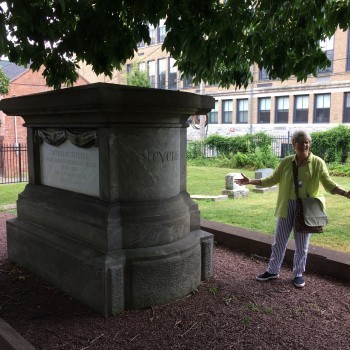 looking into applying for citizenship. I came home from Lancaster ready to write but then I went on Facebook and found out about the White supremacist mass shooting in El Paso; woke up the next morning and there was another mass shooting by a White man in Dayton who seems to have targeted Blacks. And suddenly I didn’t want to write. I didn’t want to think about a future here. I wanted to burrow deep underground. I wanted my own secret compartment in a train that would carry me to safety. But no one reached free states without help. You have to have community. Allies. Accomplices. I have the option to go back where I came from, but it is an act of resistance to stay and fight for the home you truly want and deserve. The Free Dictionary defines a “magic bullet” as, “Something that provides an immediate and extremely effective solution to a given problem or difficulty, especially one that is normally very complex or hard to resolve.” There is no magic bullet, no quick and easy way to solve all the things that are wrong with this country. But there is so much worth fighting for…and we’re not new to this. That’s what I’m holding onto right now. We’ve always faced hatred and violence. It’s exhausting. But we’ve also built homes and communities and businesses…we’ve fought for our right to be here and be healthy and happy. I moved to Philly to learn more about my Black ancestors who lived here and left for Canada in the 1830s. I reversed that migration 25 years ago and I’m not ready to give up on the US. For now, “fight” is a stronger impulse than “flight.” For now.
looking into applying for citizenship. I came home from Lancaster ready to write but then I went on Facebook and found out about the White supremacist mass shooting in El Paso; woke up the next morning and there was another mass shooting by a White man in Dayton who seems to have targeted Blacks. And suddenly I didn’t want to write. I didn’t want to think about a future here. I wanted to burrow deep underground. I wanted my own secret compartment in a train that would carry me to safety. But no one reached free states without help. You have to have community. Allies. Accomplices. I have the option to go back where I came from, but it is an act of resistance to stay and fight for the home you truly want and deserve. The Free Dictionary defines a “magic bullet” as, “Something that provides an immediate and extremely effective solution to a given problem or difficulty, especially one that is normally very complex or hard to resolve.” There is no magic bullet, no quick and easy way to solve all the things that are wrong with this country. But there is so much worth fighting for…and we’re not new to this. That’s what I’m holding onto right now. We’ve always faced hatred and violence. It’s exhausting. But we’ve also built homes and communities and businesses…we’ve fought for our right to be here and be healthy and happy. I moved to Philly to learn more about my Black ancestors who lived here and left for Canada in the 1830s. I reversed that migration 25 years ago and I’m not ready to give up on the US. For now, “fight” is a stronger impulse than “flight.” For now.
July 31, 2019
crunching numbers
 Today I went for a run for the first time in about three weeks! I had blood work done this month and finally looked at the results last night; my A1C is fine and my cholesterol—though still over the official limit—dropped about fifty points! That’s after going *off* the medication back in January. Relieved and inspired, I got out early and enjoyed the cooler temperatures; I feel like I’ve been living mostly indoors (and mostly on the couch) due to yet another heatwave here in Philly. Yesterday I braved the heat to get my eyes tested; my prescription hasn’t changed much, and the doctor took the time to show me how healthy my retinas and blood vessels are…good to know! I need progressives but look forward to finally being able to see both my phone and street signs. I haven’t written much lately because I’ve been traveling and then I had company for a few days. While my cousin was visiting from Canada, we went out to Lancaster to meet up with her friends and guess who sort of fell in
Today I went for a run for the first time in about three weeks! I had blood work done this month and finally looked at the results last night; my A1C is fine and my cholesterol—though still over the official limit—dropped about fifty points! That’s after going *off* the medication back in January. Relieved and inspired, I got out early and enjoyed the cooler temperatures; I feel like I’ve been living mostly indoors (and mostly on the couch) due to yet another heatwave here in Philly. Yesterday I braved the heat to get my eyes tested; my prescription hasn’t changed much, and the doctor took the time to show me how healthy my retinas and blood vessels are…good to know! I need progressives but look forward to finally being able to see both my phone and street signs. I haven’t written much lately because I’ve been traveling and then I had company for a few days. While my cousin was visiting from Canada, we went out to Lancaster to meet up with her friends and guess who sort of fell in 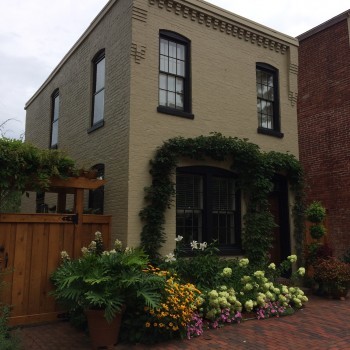 love? We saw so many sweet row houses (the owner of this one came out and gave us a tour of his garden!) that when we got home that evening, I looked online for available rentals. That led to me going back last weekend and then again on Tuesday. I *think* I’ve found the one—a top-floor 2BR in a pretty Victorian property with a garden on the side. It’s just over an hour by train back into Philly and though I hate to leave my lovely neighborhood, I do find myself wanting more peace and quiet. A friend who lives in the area said that between Philly and Pittsburgh, Pennsylvania looks a lot like Alabama—very red. Most progressives do live in big cities but Lancaster is full of artists…I think I’m ready to take a chance on a new way of living. Will hold off on buying a car and see how walkable the city is (it’s only two square miles!); I’ve gotten excellent advice from the Lyft drivers I’ve met there, so that’s another option. The population is quite diverse with a large Puerto Rican and African American community. It will be interesting to see if there’s any interest in my books. I reached out to the youth librarian at the public library but haven’t heard back so far.
love? We saw so many sweet row houses (the owner of this one came out and gave us a tour of his garden!) that when we got home that evening, I looked online for available rentals. That led to me going back last weekend and then again on Tuesday. I *think* I’ve found the one—a top-floor 2BR in a pretty Victorian property with a garden on the side. It’s just over an hour by train back into Philly and though I hate to leave my lovely neighborhood, I do find myself wanting more peace and quiet. A friend who lives in the area said that between Philly and Pittsburgh, Pennsylvania looks a lot like Alabama—very red. Most progressives do live in big cities but Lancaster is full of artists…I think I’m ready to take a chance on a new way of living. Will hold off on buying a car and see how walkable the city is (it’s only two square miles!); I’ve gotten excellent advice from the Lyft drivers I’ve met there, so that’s another option. The population is quite diverse with a large Puerto Rican and African American community. It will be interesting to see if there’s any interest in my books. I reached out to the youth librarian at the public library but haven’t heard back so far.
 The paperback edition of DRAGONS IN A BAG comes out on August 13. The cover looks good, though I was disappointed that my publisher chose not to print the golden ALSC Notable seal. I’ve purchased some stickers myself—again—and will put them on my 36 author copies, which I’m planning to raffle off. Two bloggers have offered to host my giveaways and I’m looking into having a local bookstore host the third since not everyone lives online. So if you could use a set of books for your classroom, library, or kids’ book club, stay tuned…
The paperback edition of DRAGONS IN A BAG comes out on August 13. The cover looks good, though I was disappointed that my publisher chose not to print the golden ALSC Notable seal. I’ve purchased some stickers myself—again—and will put them on my 36 author copies, which I’m planning to raffle off. Two bloggers have offered to host my giveaways and I’m looking into having a local bookstore host the third since not everyone lives online. So if you could use a set of books for your classroom, library, or kids’ book club, stay tuned…
July 10, 2019
clicks, cliques, and clubs
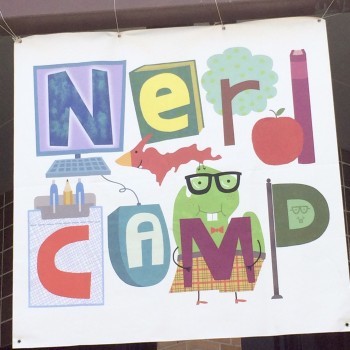 I’ve never been cool. Not as a kid, not as a teenager, not in college or graduate school. Being nerdy and Black comes with particular challenges; since nerdiness has been racialized, to be a Black nerd (or Blerd) is to be not just a social outcast but to be perceived (and condemned) as White-identified. I think that has changed since I was a kid with a big sister who insisted that “fairies are for White girls.” Black geeks no longer seem as isolated—they have a presence on social media and opportunities to gather at their own conventions. I didn’t know other Black geeks when I was young, which forced me to hide my interest in unicorns, wizards, and dragons. I still had friends, though, and have only become something of a loner since hitting my 40s. Facebook helps me stay connected but I haven’t really used social media to build the kind of fan base some authors enjoy; as I wrote in a poem last spring, “popularity has never been my priority.” I’d rather be alone, chatting with my imaginary characters, or hanging out with real folks who let me be my true self.
I’ve never been cool. Not as a kid, not as a teenager, not in college or graduate school. Being nerdy and Black comes with particular challenges; since nerdiness has been racialized, to be a Black nerd (or Blerd) is to be not just a social outcast but to be perceived (and condemned) as White-identified. I think that has changed since I was a kid with a big sister who insisted that “fairies are for White girls.” Black geeks no longer seem as isolated—they have a presence on social media and opportunities to gather at their own conventions. I didn’t know other Black geeks when I was young, which forced me to hide my interest in unicorns, wizards, and dragons. I still had friends, though, and have only become something of a loner since hitting my 40s. Facebook helps me stay connected but I haven’t really used social media to build the kind of fan base some authors enjoy; as I wrote in a poem last spring, “popularity has never been my priority.” I’d rather be alone, chatting with my imaginary characters, or hanging out with real folks who let me be my true self.
Last month when I was watching the first Democratic Party debate, I got a sick feeling in my stomach and soon changed the channel. It was painful to see so many intelligent people jockeying for attention and trying to steal the spotlight by diminishing someone else. It also seemed like such an ineffective way to select a presidential candidate, but that’s the introvert in me recognizing that public performances aren’t easy for some folks. You might be thoughtful, considerate, and have a lot to contribute but if you can’t impress the audience by manufacturing zingers and viral sound bytes, you probably won’t make it to the next round. The cult of personality is real and that’s 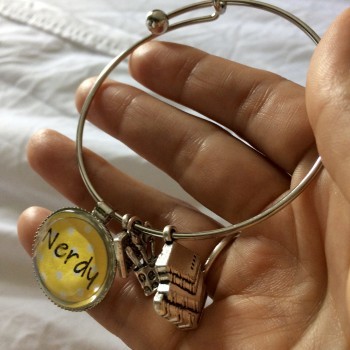 partly how we wound up with someone so petty and incompetent running the country. In kid lit, there’s also a lot of emphasis placed on popularity and clicks—one Big 5 editor told my last agent that they’re only looking at picture books by celebrities and social media influencers. Whenever I’m at a mainstream kid lit event, I find myself reflecting on how the publishing industry shapes the way authors interact with readers. I’m not a celebrity author but I’m still able to earn a living as a writer. Today I received an invitation to join a speaker series in MA next year; it came from a professor/parent whose librarian friend regularly sends my books to her daughter. Scholastic recently inquired about reprinting Dayshaun’s Gift, Book #2 in my City Kids series; the ALA’s Great Stories Club is using Mother of the Sea with their nation-wide program for teens. Tomorrow I’m giving a talk at the Philadelphia Museum of Art; the education department there hosts an annual week-long seminar for teachers and they’re all getting a copy of Milo’s Museum. Increasingly people are recognizing that self-publishing is a viable alternative for those systematically excluded by a racist publishing industry. I’m aware, however, that when I attend a mainstream conference, there will likely be no conversation about self-publishing and the circumstances that make it necessary unless I bring it up. Sometimes I risk it. Sometimes I don’t feel safe or sure that allies will have my back.
partly how we wound up with someone so petty and incompetent running the country. In kid lit, there’s also a lot of emphasis placed on popularity and clicks—one Big 5 editor told my last agent that they’re only looking at picture books by celebrities and social media influencers. Whenever I’m at a mainstream kid lit event, I find myself reflecting on how the publishing industry shapes the way authors interact with readers. I’m not a celebrity author but I’m still able to earn a living as a writer. Today I received an invitation to join a speaker series in MA next year; it came from a professor/parent whose librarian friend regularly sends my books to her daughter. Scholastic recently inquired about reprinting Dayshaun’s Gift, Book #2 in my City Kids series; the ALA’s Great Stories Club is using Mother of the Sea with their nation-wide program for teens. Tomorrow I’m giving a talk at the Philadelphia Museum of Art; the education department there hosts an annual week-long seminar for teachers and they’re all getting a copy of Milo’s Museum. Increasingly people are recognizing that self-publishing is a viable alternative for those systematically excluded by a racist publishing industry. I’m aware, however, that when I attend a mainstream conference, there will likely be no conversation about self-publishing and the circumstances that make it necessary unless I bring it up. Sometimes I risk it. Sometimes I don’t feel safe or sure that allies will have my back.
Celebrity educators are new to me, though I’ve seen some teachers on Instagram sharing innovative lesson plans and student enthusiasm for Dragons in a Bag. I’d heard about Nerd Camp and have been invited to the versions in NJ and Long Island, but it was a surprise when my Random House publicist told me last year that I’d been invited to the original camp in Michigan. I’ve been writing about Black geeks (Bleeks) for a long time, but didn’t think my books were on the radar of Colby Sharp and his Nerdy Book Club. So I went to MI with an equal measure of curiosity and dread. I’ve already written and spoken publicly about fangirling in kid lit, so I won’t go into that again. Abby Cooper kindly let me join her session on magical realism, and allowed me to explain why I prefer to call my work speculative fiction; we had a small group but a good discussion, and I got to meet two librarian friends that I usually only see online. This was the first 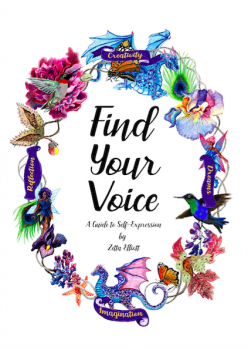 promotional event Random House has fully paid for but they sent no ARCs of The Dragon Thief so there was a very short line at my signing station; I was glad I brought some of my own books and educators happily accepted free copies of my self-published writing guide and workbook. I was pretty sure there wouldn’t be much racial diversity among the 1800 attendees at Nerd Camp; as soon as I reached the school on Monday, I started counting Black and Brown faces and didn’t make it to ten before I returned to the hotel. The overwhelming majority of teachers, librarians, and booksellers in this country are White women, so I expected I would be in the minority. That’s true of all the mainstream kid lit events I attend. But before leaving Philly, I asked on Facebook whether book lovers from nearby Flint and Detroit would be in attendance and a Black librarian friend made it plain: NO. Another White friend chimed in—somewhat defensively, I thought—and insisted that the Nerd Camp team did a lot to promote authors. Their commitment to having an inclusive roster of kid lit creators was apparent. So why doesn’t that extend to the attendees? The highlight for me was Nerd Camp Jr.—kids and their parents were lined up around the school when I arrived yesterday evening, and my three classes were full of focused, energetic young writers. I rarely get invited to majority White schools, so it’s always interesting to see how my activities are received by White students. But again—out of more than 60 students, just a handful were kids of color. A librarian friend in MI pointed out that the camp seems to attract a lot of repeaters; those who know about the camp return year after year, traveling from all over the country for the free event. So it’s become a sort of club. Authors and illustrators donate their time, but I couldn’t have gone without my corporate publisher covering my travel and accommodation. And, of course, I was invited. On the hour-long drive to the airport in Detroit, I chatted with fellow Random House author Stacy McAnulty about fees for school visits, presenting at conferences, and the challenge of promoting your books with and without support from your publisher. The day before, a media specialist shared the fees of some male celebrity authors she brought to her school last year. That kind of transparency is so meaningful, and I hope more people will be open to having honest conversations about the many ways inequality operates in the kid lit community—in ways that are obvious and not as apparent.
promotional event Random House has fully paid for but they sent no ARCs of The Dragon Thief so there was a very short line at my signing station; I was glad I brought some of my own books and educators happily accepted free copies of my self-published writing guide and workbook. I was pretty sure there wouldn’t be much racial diversity among the 1800 attendees at Nerd Camp; as soon as I reached the school on Monday, I started counting Black and Brown faces and didn’t make it to ten before I returned to the hotel. The overwhelming majority of teachers, librarians, and booksellers in this country are White women, so I expected I would be in the minority. That’s true of all the mainstream kid lit events I attend. But before leaving Philly, I asked on Facebook whether book lovers from nearby Flint and Detroit would be in attendance and a Black librarian friend made it plain: NO. Another White friend chimed in—somewhat defensively, I thought—and insisted that the Nerd Camp team did a lot to promote authors. Their commitment to having an inclusive roster of kid lit creators was apparent. So why doesn’t that extend to the attendees? The highlight for me was Nerd Camp Jr.—kids and their parents were lined up around the school when I arrived yesterday evening, and my three classes were full of focused, energetic young writers. I rarely get invited to majority White schools, so it’s always interesting to see how my activities are received by White students. But again—out of more than 60 students, just a handful were kids of color. A librarian friend in MI pointed out that the camp seems to attract a lot of repeaters; those who know about the camp return year after year, traveling from all over the country for the free event. So it’s become a sort of club. Authors and illustrators donate their time, but I couldn’t have gone without my corporate publisher covering my travel and accommodation. And, of course, I was invited. On the hour-long drive to the airport in Detroit, I chatted with fellow Random House author Stacy McAnulty about fees for school visits, presenting at conferences, and the challenge of promoting your books with and without support from your publisher. The day before, a media specialist shared the fees of some male celebrity authors she brought to her school last year. That kind of transparency is so meaningful, and I hope more people will be open to having honest conversations about the many ways inequality operates in the kid lit community—in ways that are obvious and not as apparent.
July 1, 2019
Safe Kids Stories
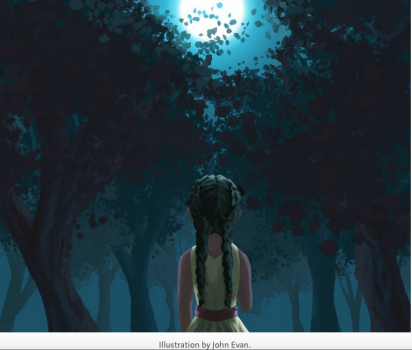 Last spring I was a guest on Lori Tharps’s podcast My American Melting Pot; Philadelphia literary legend Lorene Cary happened to be listening and reached out to see if I’d be willing to serve as guest editor for her online journal SAFE KIDS STORIES, which celebrates “the power of young people and those who care for them to tell their own stories.” The summer fiction issue went up today and the illustrations are just amazing—do check it out and share with the young readers in your life. Here’s part of my introduction:
Last spring I was a guest on Lori Tharps’s podcast My American Melting Pot; Philadelphia literary legend Lorene Cary happened to be listening and reached out to see if I’d be willing to serve as guest editor for her online journal SAFE KIDS STORIES, which celebrates “the power of young people and those who care for them to tell their own stories.” The summer fiction issue went up today and the illustrations are just amazing—do check it out and share with the young readers in your life. Here’s part of my introduction:
As a scholar, I focus on the trauma caused by racial violence. When I’m writing for children or teens, I try to balance my duty to “teach the youth the truth” with my desire to steer impressionable young minds away from cynicism and despair. I struggled with depression as a teen and for me books were a way to escape my own grim reality for an hour or two. As an adult reader and writer, I now see things differently; my stories are filled with mythical creatures, ghosts, and portals that lead to other realms, but my characters must still confront the harsh realities of the real world — bias, injustice, and even terror. My hope is that my fantasy fiction will feed the imagination of young readers, offering “dream tools” they can use to reshape rather than escape our imperfect society.
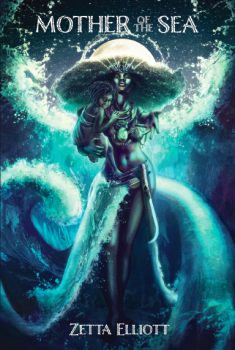 Last week I got confirmation that my novelette MOTHER OF THE SEA has been selected for the Great Stories Club (GSC) of the American Library Association. The GSC is “a literature-based reading and discussion program for teens in juvenile justice, alternative schools, residential treatment programs, group homes, and other settings that reach underserved youth. Your novel, Mother of the Sea, is one of six books currently included as part of the GSC series on the theme ‘Deeper than our Skins’ which is made possible by a grant from the National Endowment for the Humanities.” The best part is that the grant covers author visits so I’ll get to meet some of the teens in the book club!
Last week I got confirmation that my novelette MOTHER OF THE SEA has been selected for the Great Stories Club (GSC) of the American Library Association. The GSC is “a literature-based reading and discussion program for teens in juvenile justice, alternative schools, residential treatment programs, group homes, and other settings that reach underserved youth. Your novel, Mother of the Sea, is one of six books currently included as part of the GSC series on the theme ‘Deeper than our Skins’ which is made possible by a grant from the National Endowment for the Humanities.” The best part is that the grant covers author visits so I’ll get to meet some of the teens in the book club!
We’ve had a two-day break from the heatwave and I got some really good writing done over the weekend. The 4th is coming up and Philly has lots of free events to celebrate. Tomorrow I see what I’m hoping will be “the one”—a huge 2BR apartment up in Mt. Airy. I started my search there last spring but ultimately chose West Philly instead, and now I’ve come full circle. Been doing some unhealthy circling/ruminating today so working to break that particular cycle and get back into creative mode. Much better to develop poetry about this Puerto Rican family in 1980s Brooklyn than to pick apart my own family’s problems! Watching this incredible documentary reminded me of my first trip to Brooklyn back in 1980. NYC seemed a little scary then but twenty years later I couldn’t imagine calling any other place home…another circle…
June 22, 2019
comfort
I love bells. My latest picture book story mentions how chiming church bells make clocks unnecessary, and last spring I wrote a haiku in tribute to my West Philly neighborhood as well:
wind chimes and church bells
baptize us; in the gutter
blossoms blanket grit
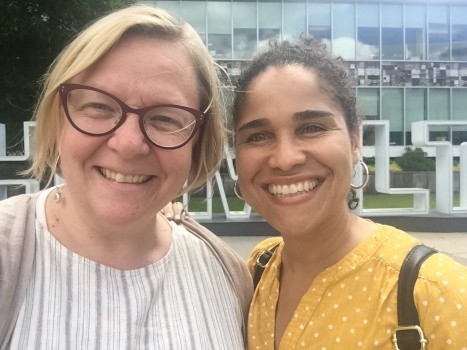 Right now I’m sitting alone on a church pew on my cousin’s porch; she’s at a maker’s market downtown and her husband is out walking the dog. It’s just me and the birds in their sunny backyard and the breeze sometimes swells enough to trigger their wind chime. This is bliss. After a fairly intense week, this is just what the doctor ordered—24 hours of calm and quiet and communion with folks who take me just as I am. I tend to think of myself as being alienated from my family, but really I have families—or rather multiple configurations of family. Sometimes I feel invisible when I’m with kin, and other times I feel fully seen. My mother has seven living siblings; on that side of the family I have twenty-five cousins and they’re some of the kindest people I know. All week I’ve had friends and family checking in on me, asking about my mother’s health and offering assistance. Do you need to talk? Do you want company? Can I drive you anywhere? Witnessing my mother’s increasing frailty has been hard, largely because I can’t always make things better and she’s often embarrassed by things that are beyond her control. But it’s also humbling to realize the limits of my own generosity and capacity for compassion; we aren’t close and too many past resentments keep resurfacing. I mostly managed to push past those but after helping my mother out for just three days, I fled to Hamilton to recover. While my cousin worked on a project about designing better affordable housing, I sat out in the sun and read or dozed. The plaza in front of City Hall had Adirondack chairs and two cascading fountains; when I got too hot, I moved into the shade and used the free wifi to catch up with folks in the US. Then my cousin took me to a farm-to-table restaurant that serves comfort food; we had a delicious meal and speculated on alternate lives—what if you quit your job? how much money do you need to be happy? what if you left the country? We talked with our Jamaican server’s about her vision for affordable housing in Hamilton, and then walked over to a nearby donut shop
Right now I’m sitting alone on a church pew on my cousin’s porch; she’s at a maker’s market downtown and her husband is out walking the dog. It’s just me and the birds in their sunny backyard and the breeze sometimes swells enough to trigger their wind chime. This is bliss. After a fairly intense week, this is just what the doctor ordered—24 hours of calm and quiet and communion with folks who take me just as I am. I tend to think of myself as being alienated from my family, but really I have families—or rather multiple configurations of family. Sometimes I feel invisible when I’m with kin, and other times I feel fully seen. My mother has seven living siblings; on that side of the family I have twenty-five cousins and they’re some of the kindest people I know. All week I’ve had friends and family checking in on me, asking about my mother’s health and offering assistance. Do you need to talk? Do you want company? Can I drive you anywhere? Witnessing my mother’s increasing frailty has been hard, largely because I can’t always make things better and she’s often embarrassed by things that are beyond her control. But it’s also humbling to realize the limits of my own generosity and capacity for compassion; we aren’t close and too many past resentments keep resurfacing. I mostly managed to push past those but after helping my mother out for just three days, I fled to Hamilton to recover. While my cousin worked on a project about designing better affordable housing, I sat out in the sun and read or dozed. The plaza in front of City Hall had Adirondack chairs and two cascading fountains; when I got too hot, I moved into the shade and used the free wifi to catch up with folks in the US. Then my cousin took me to a farm-to-table restaurant that serves comfort food; we had a delicious meal and speculated on alternate lives—what if you quit your job? how much money do you need to be happy? what if you left the country? We talked with our Jamaican server’s about her vision for affordable housing in Hamilton, and then walked over to a nearby donut shop 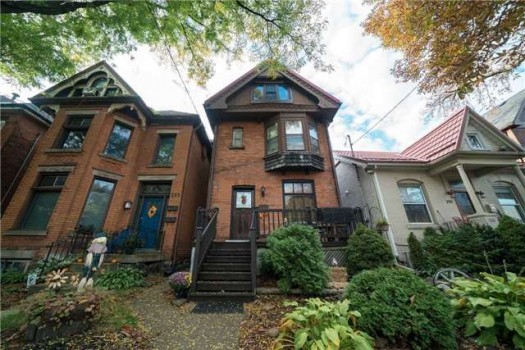 and picked up dessert. The streets were lined with quaint Victorian homes, and for a moment I thought: “This is what I want.” And it’s almost what I have in Philly—a quiet neighborhood with pretty houses, a sense of history, shady trees, and good food. Those small brick homes cost close to a million dollars, so I won’t be moving to Hamilton any time soon, but it was the vision—how the picture and the feeling matched what I sometimes see in my mind’s eye. We came home and I got a tour of her beautifully renovated home, including the large garden. I padded around in my sock feet, plucking weeds and tasting flowers my cousin assured me were edible. Then we went back inside, plunked down in our respective comfy chairs, talked about our favorite films, debated the last season of GoT with her husband, and savored our donuts (mine was maple rosemary). When we
and picked up dessert. The streets were lined with quaint Victorian homes, and for a moment I thought: “This is what I want.” And it’s almost what I have in Philly—a quiet neighborhood with pretty houses, a sense of history, shady trees, and good food. Those small brick homes cost close to a million dollars, so I won’t be moving to Hamilton any time soon, but it was the vision—how the picture and the feeling matched what I sometimes see in my mind’s eye. We came home and I got a tour of her beautifully renovated home, including the large garden. I padded around in my sock feet, plucking weeds and tasting flowers my cousin assured me were edible. Then we went back inside, plunked down in our respective comfy chairs, talked about our favorite films, debated the last season of GoT with her husband, and savored our donuts (mine was maple rosemary). When we  decided to watch Chernobyl, my cousin’s sweet Labradoodle kept coming over to me for a head scratch or to show me one of her toys; finally she hopped up on the couch and just snuggled against me. This sounds so mundane as I’m writing it, but I could totally see in that moment why people get married, buy homes, and have pets. I don’t think the first two options are right for me, but maybe I could use a therapy animal! I went to bed realizing—not for the first time—that I’m not doing enough in my life to meet all of my needs. I spend too much time alone. I don’t do enough for others. I say I’m not a joiner and use that as an excuse not to get involved in my community—then I complain about feeling disconnected. I haven’t built up the emotional stamina to really invest in others…and that’s because I over-invested in some folks in my youth and got burned. And it’s the Scorpio way to swing between extremes, but that’s not the best way to live.
decided to watch Chernobyl, my cousin’s sweet Labradoodle kept coming over to me for a head scratch or to show me one of her toys; finally she hopped up on the couch and just snuggled against me. This sounds so mundane as I’m writing it, but I could totally see in that moment why people get married, buy homes, and have pets. I don’t think the first two options are right for me, but maybe I could use a therapy animal! I went to bed realizing—not for the first time—that I’m not doing enough in my life to meet all of my needs. I spend too much time alone. I don’t do enough for others. I say I’m not a joiner and use that as an excuse not to get involved in my community—then I complain about feeling disconnected. I haven’t built up the emotional stamina to really invest in others…and that’s because I over-invested in some folks in my youth and got burned. And it’s the Scorpio way to swing between extremes, but that’s not the best way to live.
I ate the rest of my donut for breakfast. I’ve had too many donuts this week but I’ve hit my step goal almost every day and will get back to eating right tomorrow. We’ll be heading to the airport soon and I really need to think about building a fuller life in Philly. I’ve found a broker to help me with the apartment search and she seems to think we’ve got plenty of time to find the right place before my lease expires. But I don’t just need a space that’s big enough to hold all my belongings, I need to plug back in—spend less time in my head and more time engaged in the world. It’s easier to just keep moving than it is to stay put and build. Time to stop taking the easy way out…
June 19, 2019
home?
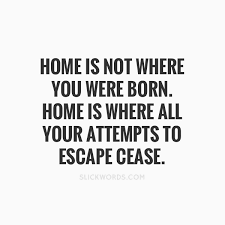 Recently on Facebook a poet friend shared a meme; it featured a man making a statement in Arabic, which was then translated into English. Can’t find it now, of course, but the gist was: home isn’t where you’re born, it’s the place from which you stop trying to escape. Okay—I found the quote and it’s by Egyptian writer and Nobel Prize winner Naguib Mahfouz. I can’t remember if I “liked” my friend’s post but I certainly paused to think about whether or not I agreed with the sentiment—and whether I’ve ever ceased trying to escape. When I first got to Brooklyn I was so in love with the borough that I couldn’t imagine ever wanting to leave—but I did eventually. I’ve been restless for several years and know it’s not really about my environment; it’s an internal dissatisfaction, hunger, anger…it’s a lot. Yesterday I got up at dawn, packed, took a cab to the train station in Philly, took the train to Newark, got the shuttle to the airport, flew to Toronto, took the shuttle into the city, took the subway to the east end, and caught a cab to the assisted living facility where my mother will be staying. The driver was an elderly Jamaican man and we talked about the shooting at the Raptors’ victory parade, and how to stop these young men from turning to guns (or knives) to solve their problems. When we pulled up, I paid him and was surprised to see him get out of the car. I had my bag with me in the back seat but it turned out he just wanted to shake my hand! And I realized that our 15-minute chat in the cab was the most comfort I’d felt that day. After traveling with a knot of dread in my belly, it was nice to just relax and connect with a stranger who felt familiar because we were both Caribbean, both immigrants, both aware of how hard it can be to make a life in Canada (he had family in the US that he visited often). My mother was late getting discharged from the hospital so never made it to the care home, so I walked the 3KM to her apartment and stopped along the way to pick up some dinner. In situations like these I just try to make myself useful. But I’m not a medical professional; today it was my aunt the nurse who noticed the care home staff were about to give my mother blood thinners even though the doctor took her off them due to the bleeding in her brain. Mom has moments of clarity and moments of confusion; it’s a big transition that may or may not be temporary. I’m not a very good caregiver—I have never cultivated the kind of emotional stamina needed to put others first. Teaching demands that at times but caring for a sick parent is something else entirely. I’m thinking about my father a lot these days and how I said fifteen years ago when he died that I would try to do better the next time around. Now the next time is here and it’s just as scary and bewildering and I have that same impulse to flee…but for now I’m taking deep breaths and working on my book proposal that’s due tomorrow. I’ll have lunch with my mother at the care home and hopefully she’ll start to settle in. We see the neurologist on Friday and then I head “home” on Saturday. For most of my life, family has been my greatest source of disappointment. As a result I didn’t want to feel bound to anyone or any place, and made choices that I felt would keep me free. But that’s not how the heart works, is it?
Recently on Facebook a poet friend shared a meme; it featured a man making a statement in Arabic, which was then translated into English. Can’t find it now, of course, but the gist was: home isn’t where you’re born, it’s the place from which you stop trying to escape. Okay—I found the quote and it’s by Egyptian writer and Nobel Prize winner Naguib Mahfouz. I can’t remember if I “liked” my friend’s post but I certainly paused to think about whether or not I agreed with the sentiment—and whether I’ve ever ceased trying to escape. When I first got to Brooklyn I was so in love with the borough that I couldn’t imagine ever wanting to leave—but I did eventually. I’ve been restless for several years and know it’s not really about my environment; it’s an internal dissatisfaction, hunger, anger…it’s a lot. Yesterday I got up at dawn, packed, took a cab to the train station in Philly, took the train to Newark, got the shuttle to the airport, flew to Toronto, took the shuttle into the city, took the subway to the east end, and caught a cab to the assisted living facility where my mother will be staying. The driver was an elderly Jamaican man and we talked about the shooting at the Raptors’ victory parade, and how to stop these young men from turning to guns (or knives) to solve their problems. When we pulled up, I paid him and was surprised to see him get out of the car. I had my bag with me in the back seat but it turned out he just wanted to shake my hand! And I realized that our 15-minute chat in the cab was the most comfort I’d felt that day. After traveling with a knot of dread in my belly, it was nice to just relax and connect with a stranger who felt familiar because we were both Caribbean, both immigrants, both aware of how hard it can be to make a life in Canada (he had family in the US that he visited often). My mother was late getting discharged from the hospital so never made it to the care home, so I walked the 3KM to her apartment and stopped along the way to pick up some dinner. In situations like these I just try to make myself useful. But I’m not a medical professional; today it was my aunt the nurse who noticed the care home staff were about to give my mother blood thinners even though the doctor took her off them due to the bleeding in her brain. Mom has moments of clarity and moments of confusion; it’s a big transition that may or may not be temporary. I’m not a very good caregiver—I have never cultivated the kind of emotional stamina needed to put others first. Teaching demands that at times but caring for a sick parent is something else entirely. I’m thinking about my father a lot these days and how I said fifteen years ago when he died that I would try to do better the next time around. Now the next time is here and it’s just as scary and bewildering and I have that same impulse to flee…but for now I’m taking deep breaths and working on my book proposal that’s due tomorrow. I’ll have lunch with my mother at the care home and hopefully she’ll start to settle in. We see the neurologist on Friday and then I head “home” on Saturday. For most of my life, family has been my greatest source of disappointment. As a result I didn’t want to feel bound to anyone or any place, and made choices that I felt would keep me free. But that’s not how the heart works, is it?
June 12, 2019
future vision
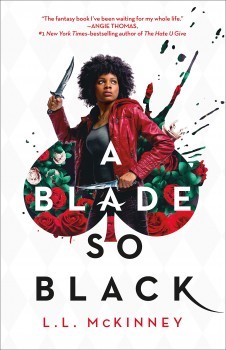 My lease is up in August. That means a) I’ve been living in Philly for almost a year and b) I have to start looking for a new place to live. I put a lot of effort into beautifying my current apartment but the rent’s going up so I’m moving on. Today’s appointments were eye-opening…in a way I felt like I’d gone back in time. When I was in my 20s, I’d never lived on my own before and so jumped at the chance to rent a 1BR apartment across the street from the Brooklyn Botanic Garden. Sure, there were guys selling drugs out front in the evening and the elevator often reeked of urine (when it was even operational). But my top-floor apartment was clean and bright, and I painted the walls my favorite colors. Now that I’m nearing 50, I no longer have to make those kind of compromises. But I’m also unsure about my future in this country, so I don’t really think about buying property and wouldn’t mind finding a cheap crash pad until I figure out just where I’m heading next. My mother’s recovery from her fall in April is taking longer than expected so she’s moving into a facility for a few weeks. We’re calling it temporary but I think we all know it might not be. Still, that means her 2BR apartment in Toronto will be empty with the car sitting in the underground garage. Do I want to move “back home”? Not really! But it just shows that life comes at you fast sometimes. It would be nice if we could see what the future holds, but perhaps the best we can do is try to be ready for most if not all possibilities.
My lease is up in August. That means a) I’ve been living in Philly for almost a year and b) I have to start looking for a new place to live. I put a lot of effort into beautifying my current apartment but the rent’s going up so I’m moving on. Today’s appointments were eye-opening…in a way I felt like I’d gone back in time. When I was in my 20s, I’d never lived on my own before and so jumped at the chance to rent a 1BR apartment across the street from the Brooklyn Botanic Garden. Sure, there were guys selling drugs out front in the evening and the elevator often reeked of urine (when it was even operational). But my top-floor apartment was clean and bright, and I painted the walls my favorite colors. Now that I’m nearing 50, I no longer have to make those kind of compromises. But I’m also unsure about my future in this country, so I don’t really think about buying property and wouldn’t mind finding a cheap crash pad until I figure out just where I’m heading next. My mother’s recovery from her fall in April is taking longer than expected so she’s moving into a facility for a few weeks. We’re calling it temporary but I think we all know it might not be. Still, that means her 2BR apartment in Toronto will be empty with the car sitting in the underground garage. Do I want to move “back home”? Not really! But it just shows that life comes at you fast sometimes. It would be nice if we could see what the future holds, but perhaps the best we can do is try to be ready for most if not all possibilities.
 Last month The Horn Book celebrated the 50th anniversary of the Coretta Scott King Award (CSK) with a special issue. There are some fantastic pieces by major players in the kid lit community, but this one by Stephanie Toliver is EVERYTHING. Why, over the course of five decades, has the CSK only gone to a handful of sci-fi/fantasy (SFF) books? And could that be why publishers are so reluctant to acquire speculative manuscripts from Black writers? When we don’t give Black children the fantastic stories they crave, what happens to their own ability to dream about the future? I’m honored that Stephanie cites CIN’S MARK as an example of a SFF title that meets the criteria for the CSK. Here’s a bit of what she had to say:
Last month The Horn Book celebrated the 50th anniversary of the Coretta Scott King Award (CSK) with a special issue. There are some fantastic pieces by major players in the kid lit community, but this one by Stephanie Toliver is EVERYTHING. Why, over the course of five decades, has the CSK only gone to a handful of sci-fi/fantasy (SFF) books? And could that be why publishers are so reluctant to acquire speculative manuscripts from Black writers? When we don’t give Black children the fantastic stories they crave, what happens to their own ability to dream about the future? I’m honored that Stephanie cites CIN’S MARK as an example of a SFF title that meets the criteria for the CSK. Here’s a bit of what she had to say:
Ultimately, using a SFF novel, Coretta Scott King and her future husband engaged in a dialogue about the future of humanity and the Black experience in the United States. They relied upon speculation to explore possible futures and the trajectories of the world. They saw Nichelle Nichols as an artistic expression of Afrofuturistic Blackness in media. Thus, I can only imagine the futuristic, visionary, and speculative thinking that could happen if the CSK Book Awards expanded their winner lists to better include these genres of literature. All Black children need more access to the kinds of stories that informed the Scott King family’s social justice philosophies. SFF is a part of the Black experience. We just need to acknowledge it.
Take time to read the entire essay—it’s an important conversation we should have had a long time ago…
June 3, 2019
turn the page
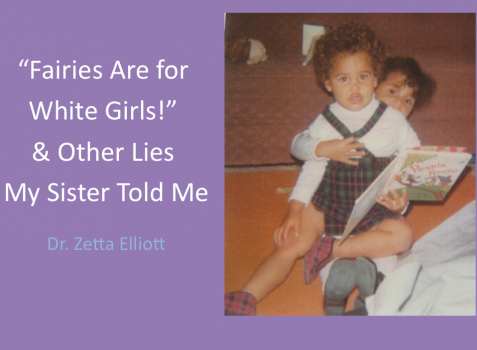 I’m tired this morning but I felt energized on Saturday following a wonderful conversation with alumni of Penn’s Graduate School of Education. Dr. Ebony Elizabeth Thomas invited me to present on my books following her own presentation on The Dark Fantastic—an important, accessible, and affordable scholarly book that has already sold out just weeks after its publication. I came home feeling more hopeful about my future as an author in Philly; it’s been hard to get into local schools so I was pleased to meet educators and administrators interested in scheduling an author visit. I sold most of the books I brought and then went to lunch with Ebony and our friend Akosua. Sometimes I feel like we should record the conversations we have over meals because they are intense—in a good way! Sometimes we wind up taking notes because we’re sharing resources and theorizing solutions to problems…I feel incredibly lucky to have friends who push me and lift me up and show me other ways of being in the world. When I posted this screenshot of my opening slide, several folks on Instagram asked me where I was going to publish my talk. It’s a slideshow but I *could* turn it into an essay…that’s not high on my To Do list right now, but I appreciate that folks are interested in what I have to say.
I’m tired this morning but I felt energized on Saturday following a wonderful conversation with alumni of Penn’s Graduate School of Education. Dr. Ebony Elizabeth Thomas invited me to present on my books following her own presentation on The Dark Fantastic—an important, accessible, and affordable scholarly book that has already sold out just weeks after its publication. I came home feeling more hopeful about my future as an author in Philly; it’s been hard to get into local schools so I was pleased to meet educators and administrators interested in scheduling an author visit. I sold most of the books I brought and then went to lunch with Ebony and our friend Akosua. Sometimes I feel like we should record the conversations we have over meals because they are intense—in a good way! Sometimes we wind up taking notes because we’re sharing resources and theorizing solutions to problems…I feel incredibly lucky to have friends who push me and lift me up and show me other ways of being in the world. When I posted this screenshot of my opening slide, several folks on Instagram asked me where I was going to publish my talk. It’s a slideshow but I *could* turn it into an essay…that’s not high on my To Do list right now, but I appreciate that folks are interested in what I have to say.
I’m not feeling that way about one of my publishers right now. The good thing about having four books in production this spring is that I can compare how different publishers invest in and promote me and my work. I’ve had quite a few challenges with Disney on the editing side of things, but their marketing team is amazing; Say Her Name doesn’t come out till January but they’ve already successfully pitched me for panels at NCTE, LRA, and YALSA, and will cover the cost of attending. I got sixteen ARCs back in March—compare that to the 5 copies I got of The Dragon Thief in February. That book comes out in October, but am I going to ALA this month? No. Has anyone on my contact list received a copy of *either* dragon book? No. Will there be a third dragon book from this publisher? Right now it doesn’t look good. At this point in my career I’m not interested in being treated like a second-class citizen by my publisher. I’ve done too much work on my own as an indie author to have to hustle just as hard because some marketing person isn’t  doing their job and/or has decided my books aren’t worth the investment.
doing their job and/or has decided my books aren’t worth the investment.
The new workbook is done and available on Amazon! I’ll be sending out a newsletter later this week but for now I’m working on an Afrofuturism session I’ll be facilitating on Thursday at the NYC Department of Education’s second annual Sexuality, Women and Gender (SWaG) conference. I was hoping to have copies of Find Your Voice to share with participants, but apparently UPS damaged the shipment I ordered last week so the books won’t arrive in time. Talking to teachers is one of my favorite things to do so I’m really looking forward to this conference even though I’m running on fumes at this point in the school year. I think the key is to push myself to present on new topics, which is what I’ll be doing this week. I can deliver most of my book talks with my eyes closed and feel myself going into autopilot some days. The workbook will push me to develop new poetry-writing workshops and maybe talking about my Viking novel will get me back on track. Summer’s coming and I need a clear writing agenda. I’ve watched almost all the episodes of Time Team on YouTube so I need to get out my literary trowel and start digging again!
May 27, 2019
what IS a poem?
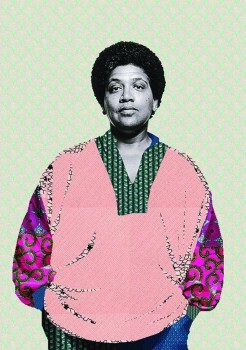 I didn’t shower today and I’m still wearing the clothes I fell asleep in last night. My permanently dented couch probably wishes I’d left the house today, but instead I paced the apartment to get my 10K steps in and worked steadily to finish my writing workbook. Since I’m making confessions, can I also admit that I don’t really love Audre Lorde’s poetry? Her essays are brilliant and I was thrilled to get permission from her estate to reprint “A Woman Speaks” in my forthcoming poetry collection. But most of her poems just aren’t my cup of tea. I found the same to be true when I was reading the collected poems of Gwendolyn Brooks last winter. It’s okay to say that, isn’t it? I wouldn’t expect any reader to love everything I write! I subscribe to poem-a-day from the Academy of American Poets and reading a poem at the start of each day has taught me a lot about my tastes as a reader. Today I reviewed the 30 poems I wrote for NaPoWriMo and picked the ones worth including in my writing workbook. I didn’t call it a poetry workbook because it’s more generally about finding ways to express yourself. I also can’t claim to be a poetry expert, as I discovered when trying to teach my Canarsie
I didn’t shower today and I’m still wearing the clothes I fell asleep in last night. My permanently dented couch probably wishes I’d left the house today, but instead I paced the apartment to get my 10K steps in and worked steadily to finish my writing workbook. Since I’m making confessions, can I also admit that I don’t really love Audre Lorde’s poetry? Her essays are brilliant and I was thrilled to get permission from her estate to reprint “A Woman Speaks” in my forthcoming poetry collection. But most of her poems just aren’t my cup of tea. I found the same to be true when I was reading the collected poems of Gwendolyn Brooks last winter. It’s okay to say that, isn’t it? I wouldn’t expect any reader to love everything I write! I subscribe to poem-a-day from the Academy of American Poets and reading a poem at the start of each day has taught me a lot about my tastes as a reader. Today I reviewed the 30 poems I wrote for NaPoWriMo and picked the ones worth including in my writing workbook. I didn’t call it a poetry workbook because it’s more generally about finding ways to express yourself. I also can’t claim to be a poetry expert, as I discovered when trying to teach my Canarsie 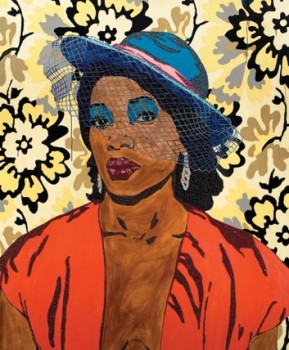 sixth graders about Walt Whitman. Many of the students found it difficult to write anything other than sentences. They could write a letter to a loved one or describe their daily commute, but most struggled to let go of the rules that govern prose. There are prose poems, of course, but I think free verse is the most accessible type of poetry and wondered why they found it so challenging. I’m waiting on proofs of my workbook and suspect I’ll need to go back and model the techniques I’ve proposed. There are quite a few of my poems in the book but they only show up as the finished product; I demonstrate how I revise my work but I’m not sure that’s enough. I added some simple art activities and suggested would-be portraitists check out the work of Mickalene Thomas (right) and Makeeba “Keebs” Rainey (above). It could be a fun book to complete with a class or a book club. I’m hoping it will appeal to teens and adults alike, and it’s only $8 so perhaps that will temper folks’ expectations. I’ll leave it to the experts to teach us how to write sonnets and villanelles. I managed to write one of each for but wouldn’t turn to either of those forms when I need to get something off my chest. There’s more than one way to be a poet—I wrote that in Say Her Name and need to keep reminding myself that my approach is as valid as any other!
sixth graders about Walt Whitman. Many of the students found it difficult to write anything other than sentences. They could write a letter to a loved one or describe their daily commute, but most struggled to let go of the rules that govern prose. There are prose poems, of course, but I think free verse is the most accessible type of poetry and wondered why they found it so challenging. I’m waiting on proofs of my workbook and suspect I’ll need to go back and model the techniques I’ve proposed. There are quite a few of my poems in the book but they only show up as the finished product; I demonstrate how I revise my work but I’m not sure that’s enough. I added some simple art activities and suggested would-be portraitists check out the work of Mickalene Thomas (right) and Makeeba “Keebs” Rainey (above). It could be a fun book to complete with a class or a book club. I’m hoping it will appeal to teens and adults alike, and it’s only $8 so perhaps that will temper folks’ expectations. I’ll leave it to the experts to teach us how to write sonnets and villanelles. I managed to write one of each for but wouldn’t turn to either of those forms when I need to get something off my chest. There’s more than one way to be a poet—I wrote that in Say Her Name and need to keep reminding myself that my approach is as valid as any other!
May 21, 2019
writing rage
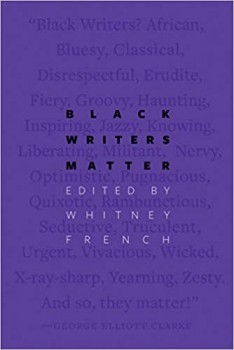 They say you don’t need to speak for others—when you’ve got the mic, just pass it along. Sometimes that’s easier said than done. I meant to give some shout-outs while I was being interviewed in Toronto but my hosts had very pointed questions and things didn’t turn out as I’d hoped. I did manage to reference Dr. Ebony Elizabeth Thomas’s new book The Dark Fantastic: Race & the Imagination from Harry Potter to the Hunger Games, but I didn’t get to talk about Whitney French who edited this excellent anthology or Nadia Hohn who is, I believe, the first Black Canadian author to be selected for the TD Children’s Book Week. It isn’t right that folks who are doing the work in the Great White North aren’t getting the attention they deserve. Neesha Meminger is another writer whose work everyone should know about; she’s got a memoir-novel in verse coming out next month, What Girls Know, and we decided to publish a discussion about writing, rage, and resistance. You can read the whole thing over at Medium but here’s a bit of “Truth-tellers & Troublemakers: a Conversation about Publishing in Canada:”
They say you don’t need to speak for others—when you’ve got the mic, just pass it along. Sometimes that’s easier said than done. I meant to give some shout-outs while I was being interviewed in Toronto but my hosts had very pointed questions and things didn’t turn out as I’d hoped. I did manage to reference Dr. Ebony Elizabeth Thomas’s new book The Dark Fantastic: Race & the Imagination from Harry Potter to the Hunger Games, but I didn’t get to talk about Whitney French who edited this excellent anthology or Nadia Hohn who is, I believe, the first Black Canadian author to be selected for the TD Children’s Book Week. It isn’t right that folks who are doing the work in the Great White North aren’t getting the attention they deserve. Neesha Meminger is another writer whose work everyone should know about; she’s got a memoir-novel in verse coming out next month, What Girls Know, and we decided to publish a discussion about writing, rage, and resistance. You can read the whole thing over at Medium but here’s a bit of “Truth-tellers & Troublemakers: a Conversation about Publishing in Canada:”
What Girls Know is an entirely different kind of book. It was fueled by a kind of rage that I really want to talk a bit more about with you, Zetta. Lately I’ve been reading a lot of essays and books about Women of Color and rage, and listening to podcasts specifically by Black women, around rage. I went through such a dark time (here, I mean dark as in the hermit walking through the night with a small flame to guide her steps) where my very survival, and the survival of my children was at stake, and it led me to this burning ember of rage. Not a destructive rage, but the kind of rage that burns everything down so something more sane, healthy, and true can be born. A rage that lights up the truth.
I started to see, with startling clarity, how desperate so many of us are to be seen. How desperate I was to be seen and validated and recognized. And how natural it is to want to be recognized for our value and worth. How, as BIPOC women, we are devalued from the moment of birth, how we fight to be seen and acknowledged at every turn from that first moment. How we are thrust and embedded into systems that were never designed for us, were never meant to exalt our gifts or contributions.
And yet, we go through our entire lives seeking some sort of validation or approval from these very systems.
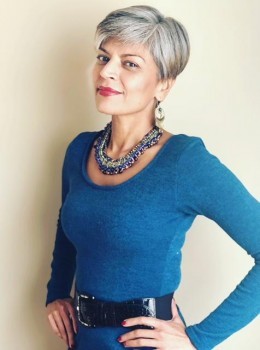 We sure do! Last month I was happy to sign with a new agent, Johanna Castillo, and we’re working now on a publishing plan. This industry has a LOT of problems, and it’s not easy to be “in it but not of it.” I’m proud to be an indie author but I still make certain compromises to advance my projects, and it’s hard sometimes to see other authors getting the red carpet treatment for books that don’t seem better than mine. It’s easy to be seduced by power so Neesha’s comments were right on time. I hope you’ll take a few minutes to read our conversation—and watch for the release of her new book!
We sure do! Last month I was happy to sign with a new agent, Johanna Castillo, and we’re working now on a publishing plan. This industry has a LOT of problems, and it’s not easy to be “in it but not of it.” I’m proud to be an indie author but I still make certain compromises to advance my projects, and it’s hard sometimes to see other authors getting the red carpet treatment for books that don’t seem better than mine. It’s easy to be seduced by power so Neesha’s comments were right on time. I hope you’ll take a few minutes to read our conversation—and watch for the release of her new book!

